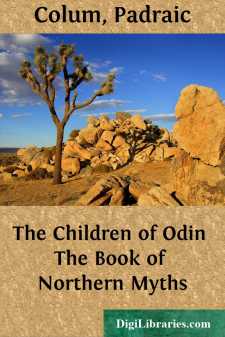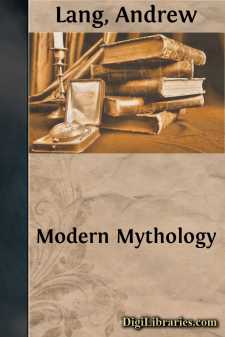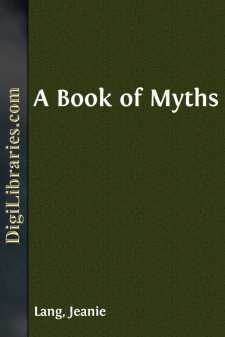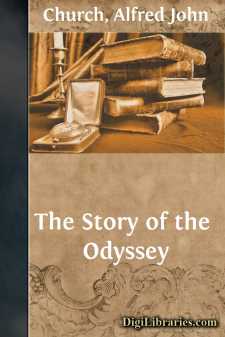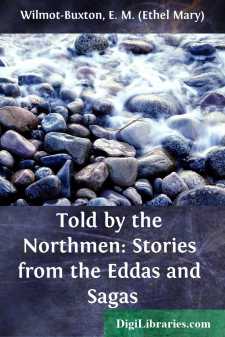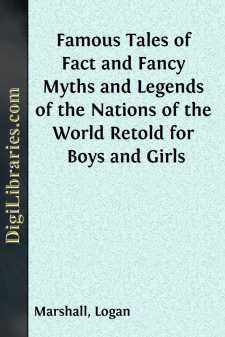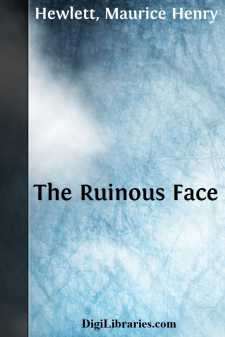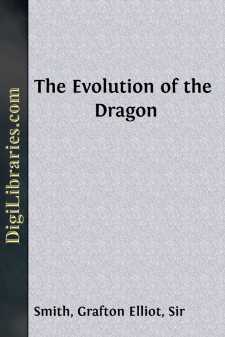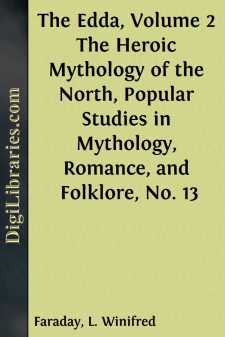Social Science
- Americana 1
- Anthropology 4
- Archaeology 7
- Criminology 2
- Emigration & Immigration 2
- Folklore & Mythology
- General 1
- Slavery 10
- Sociology 10
- Sociology of Religion 1
Folklore & Mythology Books
Sort by:
by:
Padraic Colum
FAR AWAY AND LONG AGO Once there was another Sun and another Moon; a different Sun and a different Moon from the ones we see now. Sol was the name of that Sun and Mani was the name of that Moon. But always behind Sol and Mani wolves went, a wolf behind each. The wolves caught on them at last and they devoured Sol and Mani. And then the world was in darkness and cold. In those times the Gods lived, Odin...
more...
by:
Andrew Lang
INTRODUCTION It may well be doubted whether works of controversy serve any useful purpose. ‘On an opponent,’ as Mr. Matthew Arnold said, ‘one never does make any impression,’ though one may hope that controversy sometimes illuminates a topic in the eyes of impartial readers. The pages which follow cannot but seem wandering and desultory, for they are a reply to a book, Mr. Max Müller’s...
more...
by:
Jeanie Lang
PREFACE Just as a little child holds out its hands to catch the sunbeams, to feel and to grasp what, so its eyes tell it, is actually there, so, down through the ages, men have stretched out their hands in eager endeavour to know their God. And because only through the human was the divine knowable, the old peoples of the earth made gods of their heroes and not unfrequently endowed these gods with as...
more...
INTRODUCTION Three thousand years ago the world was still young. The western continent was a huge wilderness, and the greater part of Europe was inhabited by savage and wandering tribes. Only a few nations at the eastern end of the Mediterranean and in the neighbouring parts of Asia had learned to dwell in cities, to use a written language, to make laws for themselves, and to live in a more orderly...
more...
Hakon's Lay By James Russell Lowell"O Skald, sing now an olden song,Such as our fathers heard who led great lives;And, as the bravest on a shield is borneAlong the waving host that shouts him king,So rode their thrones upon the thronging seas!"Then the old man arose: white-haired he stood,White-bearded, and with eyes that looked afarFrom their still region of perpetual snow,Over the little...
more...
by:
Logan Marshall
PROMETHEUS, THE FRIEND OF MAN Many, many centuries ago there lived two brothers, Prometheus or Forethought, and Epimetheus or Afterthought. They were the sons of those Titans who had fought against Jupiter and been sent in chains to the great prison-house of the lower world, but for some reason had escaped punishment. Prometheus, however, did not care for idle life among the gods on Mount Olympus....
more...
THE RUINOUS FACE When the siege of Troy had been ten years doing, and most of the chieftains were dead, both of those afield and those who held the walls; and some had departed in their ships, and all who remained were leaden-hearted; there was one who felt the rage of war insatiate in his bowels: Menelaus, yellow-haired King of the Argives. He, indeed, rested not day or night, but knew the fever...
more...
THE WAYSIDE. INTRODUCTORY. A short time ago, I was favored with a flying visit from my young friend Eustace Bright, whom I had not before met with since quitting the breezy mountains of Berkshire. It being the winter vacation at his college, Eustace was allowing himself a little relaxation, in the hope, he told me, of repairing the inroads which severe application to study had made upon his health; and...
more...
PREFACE. Some explanation is due to the reader of the form and scope of these elaborations of the lectures which I have given at the John Rylands Library during the last three winters. They deal with a wide range of topics, and the thread which binds them more or less intimately into one connected story is only imperfectly expressed in the title "The Evolution of the Dragon". The book has been...
more...
The Heroic Mythology of the North Sigemund the Waelsing and Fitela, Aetla, Eormanric the Goth and Gifica of Burgundy, Ongendtheow and Theodric, Heorrenda and the Heodenings, and Weland the Smith: all these heroes of Germanic legend were known to the writers of our earliest English literature. But in most cases the only evidence of this knowledge is a word, a name, here and there, with no hint of the...
more...


